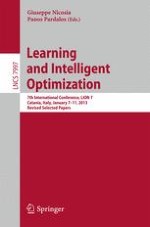2013 | OriginalPaper | Chapter
From Grammars to Parameters: Automatic Iterated Greedy Design for the Permutation Flow-Shop Problem with Weighted Tardiness
Authors : Franco Mascia, Manuel López-Ibáñez, Jérémie Dubois-Lacoste, Thomas Stützle
Published in: Learning and Intelligent Optimization
Publisher: Springer Berlin Heidelberg
Activate our intelligent search to find suitable subject content or patents.
Select sections of text to find matching patents with Artificial Intelligence. powered by
Select sections of text to find additional relevant content using AI-assisted search. powered by
